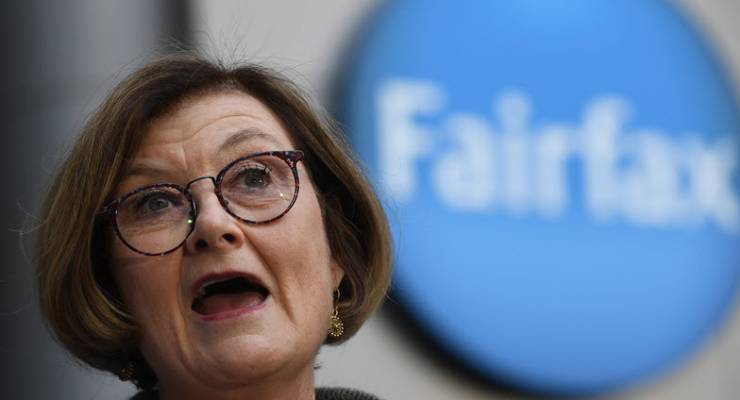
Australia’s journalism awards — like others around the world — have traditionally been a competition between outlets. Newspapers still boast about how many Walkley Awards their journalists have won or are nominated for, but increasingly those winners and finalists include collaborations between competing outlets. This year’s finalists, announced last week, include three collaborations between different news outlets.
In 2014, a collaboration between the ABC and Fairfax won the Gold Walkley, which newly appointed La Trobe University associate professor Dr Andrea Carson says was a turning point towards cross-media investigations, and away from single-newsroom investigations in Australia.
“The 20th Century business model has been broken — advertising revenues have declined, and investigative journalism takes time, but it’s important for some mastheads’ brands,” Carson said. “There’s a mutual benefit in these collaborations that may have been triggered from changes to their business models.”
In some quarters these collaborations winning awards haven’t been applauded: News Corp’s Peter Blunden criticised the Melbourne Press Club’s decision to award the Golden Quill to a collaboration between the ABC and Fairfax earlier this year. “My issue is with a commercial enterprise being subsidised by taxpayer. The ABC, owned by the people, is propping up a commercial business, then standing together on a podium collecting awards and proclaiming ‘we’re the best’. It’s not sour grapes, it’s a bad joke.”
But Carson, who has researched media collaborations around the world, said cross-media projects had increased, particularly in investigative journalism, in response to changes in the market and technology. She said that this style of reporting made the most of technological advances to continue the public good of investigative journalism, which was good for the Australian public, no matter who the collaboration was between.
“Journalists have so many opportunities that weren’t available in the 20th Century model,” she said. “Technology has completely sped up the process of gathering information, and things like data journalism are best done in teams.”
Over the past 10 years, collaborations have been increasingly represented among award finalists and winners around the world. They are mostly done for the expensive and time-consuming investigative journalism, which never paid for itself, Carson said.
“It’s always been other sorts of journalism that subsidised investigative journalism,” she said. “There are probably other genres experimenting with collaboration, but I struggle to think of other genres open to that.”
And while Australian media collaborations have been successful in prompting government action, and speaking truth to power, Carson said they can’t replace the old days where single newsroom investigative units had much more leeway to look into ideas without necessarily producing a story.
“It’s great for big picture things but you’re not going to get the nuance of investigative journalism you saw in the ’80s and ’90s. There’s no fishing exercises because there’s a lot riding on it. If you start digging, you get a certain amount of time to prove you’ve got something that will stand up,” she said.
And the investigations also don’t work for local journalism — collaborations between outlets with broadened appeal and often global audiences are looking at bigger stories such as the Panama Papers.
Carson said the key to successful collaborations was trust between the journalists working on them. The journalists worldwide working on the Panama Papers, for example, held onto the story for 12 months until they were all ready to publish. The relationship between WikiLeaks and The Guardian famously broke down after projects that had huge impact and reach.
But while there are limitations to the model, Carson said Australian audiences shouldn’t take the projects that have been done for granted. “It would be a huge loss to the Australian public if the collaborations between the ABC and Fairfax didn’t continue as a result of the Nine takeover of Fairfax,” she said. “And the number of attacks on the ABC is a dreadful thing for it. Some of our politicians are eroding the good name of the ABC, while also restricting it financially.”
This year’s Walkley investigative journalism finalists don’t include a collaboration, but the “coverage of a major event” category finalists include a joint project between Guardian Australia and community radio station 2SER, and work done by journalists for the ABC and The Australian on the Dragan Vasiljković story. The joint investigation by Fairfax and the ABC into Don Burke is a finalist in the short television current affairs category.








“The relationship between WikiLeaks and The Guardian famously broke down after projects that huge impact and reach”.
Er what.
“The relationship between WikiLeaks and The Guardian famously broke down after projects that huge impact and reach.”
I think it’s your sentence construction that’s broken down.
Sigh for a subbie, #4,738.
Perhaps the remaining meeja wot rite wurds could get together and fund one, who could then be shared?
No, Peter Blunden, it is sour grapes. Most ‘investigative’ journalism performed by Limited News rags these days seems to involve some actor’s or sports personality’s personal life.
” Now Scottie, where shall we put the Satanic Mills?”
News corp? It *is* sour grapes, vinegar level at that